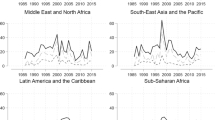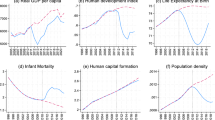Abstract
Globalization creates wealth but also financial crises. Although these systemic risks are generated by all participants in the world economy, their costs are disproportionately borne by the poor, especially women, who live in developing nations, with irrevocable damage to their capabilities. Since current reform proposals do not address inequities in the distribution of the costs of financial crises, we suggest changes in the design, implementation, content, and funding of policies that could provide security to women during crises. We argue that our suggestions will not succeed without women's participation in the debate on the reform of international financial architecture.
Similar content being viewed by others
REFERENCES
Aslanbeigui, Nahid and Gale Summerfield. 2000. “The Asian Crisis, Gender, and the International Financial Architecture.” Feminist Economics, 6 (3): 81-103.
Beck, Ulrich. 1992. Risk Society: Towards a New Modernity, translated by Mark Ritter. London: Sage Publications.
Beck, Ulrich. 1999. World Risk Society. Cambridge: Polity Press.
Berik, Günseli. 2000. “Mature Export-Led Growth and Gender Wage inequality in Taiwan.” Feminist Economics. 6 (3): 1-26.
Boserup, Ester. 1970. Woman's Role in Economic Development. St. Martin's Press, New York.
Budlender, Debbie. 2000. “The Political Economy of Women's Budgets in the South,” World Development. 28 (7): 1365-78.
Eatwell, John and Lance Taylor. 1998. “International Capital Markets and the Future of Economic Policy,” CEPA Working Paper Series III, Working Paper No. 9.
Edwards, Franklin R. 1999. “Hedge Funds and Collapse of Long-Term Capital Management,” Journal of Economic Perspectives.13 (2): 189-210.
Elson, Diane, ed. 1995. Male bias in the Development Process, 2nd edition. Manchester: Manchester University Press.
Elson, Diane and Nilufer Cagatay. 2000. “The Social Content of Macroeconomic Policies,” World Development. 28 (7): 1347-64.
Floro, Maria. 1995. “Economic Restructuring, Gender and the Allocation of Time,” World Development. Vol. 23, No. 11: 1913-29.
Floro, Maria and Gary Dymski. 2000. “Financial Crisis, Gender, and Power: An Analytical Framework,” World Development. 28 (7): 1269-83.
Frankenberg, Elizabeth, Duncan Thomas, and Kathleen Beegle. 1999. “The Real Costs of Indonesia's Economic Crisis: Preliminary Findings from the Indonesia Family Life Surveys.” Labor and Population Program Working Paper Series 99-04, RAND.
International Monetary Fund. 1999. “The IMF's Response to the Asian Crisis,” Washington D.C.
Jaquette, Jane S. and Sharon L. Wolchik (eds). 1998. Women and Democracy: Latin America and Central and Eastern Europe. Baltimore: Johns Hopkins University Press.
Kabeer, Naila. 2001. “Conflicts over Credit: Re-Evaluating the Empowerment Potential of Loans to Women in Rural Bangladesh,” World Development. 29 (1): 63-84.
Kregel, Jan A. 1998. “Derivatives and Global Capital Flows: Applications to Asia,” Cambridge Journal of Economics. 22: 677-92.
Krugman, Paul. 1998. “The Eternal Triangle.” October: online. Available HTTP: http: //web. mit.edu/krugman/www/triangle.html.
Kynch, Jocelyn and Amartya Sen. 1983. “Indian Women: Well-Being and Survival,” Cambridge Journal of Economics, 7, 363-380.
Lane, Timothy, Atish. Ghosh, Javier Hamann, Steven Phillips, Marianne Schulze-Ghattas, and Tsidi Tsikata. 1999 IMF-Supported Programs in Indonesia, Korea and Thailand: A Preliminary Assessment. (Review document of design of programs for discussion by executive board in 1998). International Monetary Fund. January.
Lee, Jong-wha and Changyong Rhee. 1998. “Social Impacts of the Asian Crisis: Policy Challenges and Lessons.” Prepared for the United Nations Development Programme, Human Development Office.
Lim, Joseph Y. 2000. “The Effects of the East Asian Crisis on the Employment of Women and Men: The Philippine Case,” World Development. 28 (7): 1285-1306.
Nussbaum, Martha. 2000. Women and Human Development: The Capabilities Approach. Cambridge: Cambridge University Press.
Oxfam International, 2000a. “The IMF and the Global Financial Architecture.” April: online. Available HTTP: http
Oxfam International, 2000b. “Reforming the IMF.” April: online. Available HTTP: http
Perrow, Charles. 1999. Normal Accidents: Living with High-Risk Technologies. Princeton: Princeton University Press.
Pigou, Arthur Cecil. 1912. Wealth and Welfare. London: Macmillan.
Pigou, Arthur Cecil. 1929. The Economics of Welfare, 3rd ed. London: Macmillan.
Robbins, Lionel. 1932. An Essay on the Nature and Significance of Economic Science. London: Macmillan.
Sen, Amartya K. 1982. Poverty and Famines: An Essay on Entitlements and Deprivation. Oxford: Clarendon Press.
Sen, Amartya K. 1993. “The Economics of Life and Death,” Scientific American, May, 40-47.
Sen, Gita. 2000. “Gender Mainstreaming in Finance Ministries,” World Development. 28 (7): 1379-90.
Singh, Ajit and Anna Zammit. 2000. “International Capital Flows: Identifying the Gender Dimension,” World Development. 28 (7): 1249-68.
Sowerwine, Jennifer. 1999. “New Land Rights and Women's Access to Medicinal Plants in Northern Vietnam,” in Irene Tinker and Gale Summerfield, eds. Women's Rights to House and Land: China, Laos, Vietnam. Boulder: Lynne Rienner Publishers, 131-42.
Stiglitz, Joseph. 2000. “Capital Market Liberalization, Economic Growth, and Instability,” World Development. 28 (6): 1075-86.
Summerfield, Gale. 1997. “Economic Transition in China and Vietnam: Crossing the Poverty Line is Just the First Step for Women and Their Families,” Review of Social Economy. 55 (Summer): 201-214.
Taylor, Lance. 1998. “Capital Market Crises: Liberalization, Fixed Exchange Rates and Market-Driven Destabilization,” Cambridge Journal of Economics. 22: 663-76.
Tobin, James. 2000. “Financial Globalization,” World Development. 28 (6): 1101-1104.
UNDP. 1999. Human Development Report 1999. New York: Oxford University Press.
UNIFEM. 2000. Progress of the World's Women 2000. Available HTTP: http: //www.unifem. undp.org/progressww/2000/index.html.
U.S. Congress. 2000. The Meltzer Report. March: online. Available HTTP: http: //www.house. gov/jec/imf/meltzer.htm.
Wade, Robert. 1998. “From 'Miracle' to 'Cronyism': Explaining the Great Asian Slump,” Cambridge Journal of Economics. 22: 693-706.
White, Marceline and Sharma, Ritu R. 1999. “The Asian Financial Crisis:Hearing Women's Voices.” Washington D.C.: An Occasional Paper from Women's Edge.
Women's Edge. 2001. “Women and International Development. The GAINS for Women and Girls Act of 2000 (The Global Action and Investments for New Success for Women and Girls) Bill Summary. January: online. Available HTTP: http: //www.womensedge.org/ development/gainssummary.htm.
Womenwatch. 2001. Available HTTP: http: //www.un.org/womenwatch/confer/beijing5.
World Bank. 1999a. “Gender Dimensions of the East Asia Crisis.” Summary of Preliminary Findings, East Asia and Pacific Region: January. Washington D.C.: World Bank.
World Bank. 1999b. Global Economic Prospects and the Developing Countries. Washington D.C.: World Bank.
Author information
Authors and Affiliations
Rights and permissions
About this article
Cite this article
Aslanbeigui, N., Summerfield, G. Risk, Gender, and Development in the 21st Century. International Journal of Politics, Culture, and Society 15, 7–26 (2001). https://doi.org/10.1023/A:1011184220863
Issue Date:
DOI: https://doi.org/10.1023/A:1011184220863




